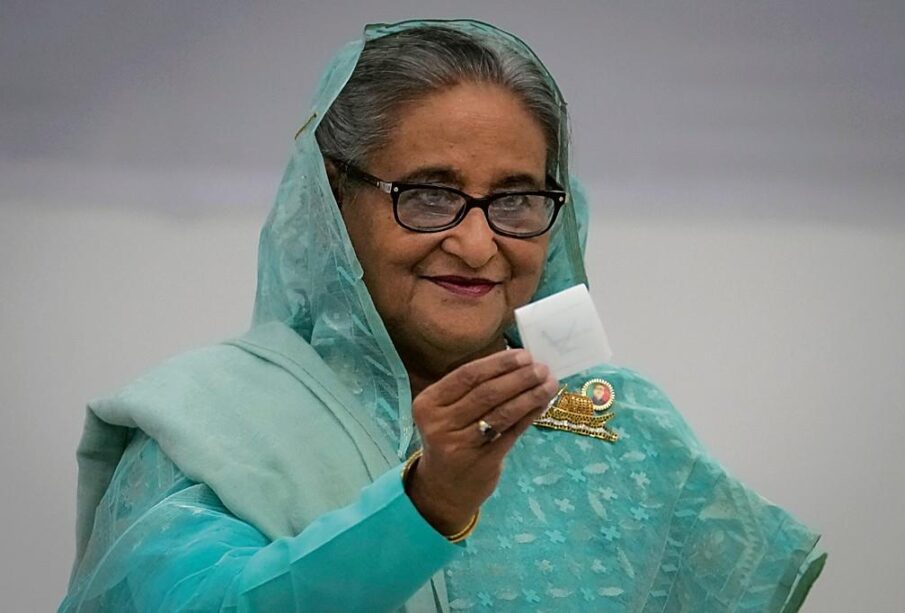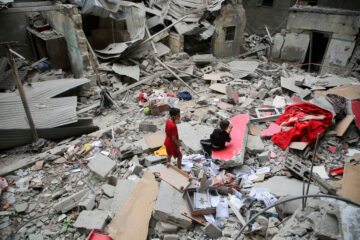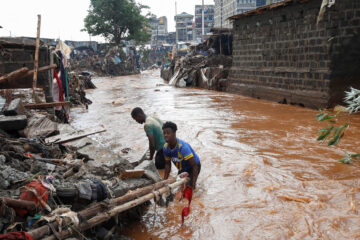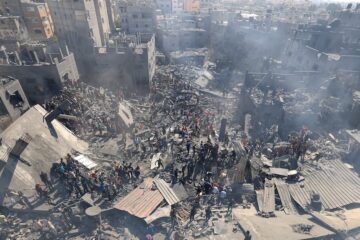Bangladeshi prime minister wins 4th consecutive term after campaign marred by violence
 Bangladesh Prime Minister Sheikh Hasina shows her ballot paper after casting her vote in Dhaka on Sunday. AP
Bangladesh Prime Minister Sheikh Hasina shows her ballot paper after casting her vote in Dhaka on Sunday. APBy Sudipto Ganguly and Ruma Paul Reuters
Bangladesh Prime Minister Sheikh Hasina secured a fourth straight term as expected with her party winning an absolute majority in the general election, the poll body said on Monday, amid low turnout in the vote boycotted by the main opposition.
The main opposition Bangladesh Nationalist Party (BNP), who participated in the 2018 polls but stayed away in 2014, boycotted the election after Hasina refused their demands to resign and allow a neutral authority to run the election.
The daughter of Sheikh Mujibur Rahman, founding father of Bangladesh who was killed in an army coup in 1975 along with most members of their family, Hasina, 76, first became prime minister in 1996 and it will be her fifth term overall.
In her past 15 years in power she has been credited with turning around the economy and the massive garments industry, winning international praise for sheltering Rohingya Muslims fleeing persecution in neighbouring Myanmar.
Bangladeshis largely stayed away from Sunday’s general election, which was marred by violence. Turnout was about 40% when polls closed, said chief election commissioner Kazi Habibul Awal, compared with over 80% in the last election in 2018.
The ruling Awami League party won 167 seats out of 227 seats with the outcome of the rest of the seats still to be unannounced, according to unofficial results released by the Election Commission.
Hasina herself bagged 249,962 votes from her constituency Gopalganj, about 165 kilometres (103 miles) from capital Dhaka, while her nearest rival secured just 469 votes.
“I am trying my best to ensure that democracy should continue in this country,” Hasina said on Sunday after casting her vote, adding that her only accountability was to Bangladesh citizen.
She has instructed party leaders and supporters not to bring out any victory processions or indulge in celebrations, said Awami League’s general secretary Obaidul Quader.
Polls were held for 299 directly elected parliamentary seats with close to 120 million voters choosing from nearly 2,000 contestants. Election to one seat will be held at a later date after an independent contestant died ahead of the vote due to natural causes.
Among the ruling party winners were former Bangladesh cricket captains Shakib Al Hasan and Mashrafe Mortaza.
Independent candidates, many of them Awami League party members of various ranks, won 49 seats.
BNP has accused the ruling party of propping up ‘dummy’ independent candidates to try to make the election look credible. Awami League has denied the accusation.
The BNP called a two-day strike nationwide through Sunday, asking people to shun the election, and said the low turnout was a success for their boycott call.
Hasina has accused the opposition of instigating anti-government protests that have rocked Dhaka since late October and killed at least 14 people.
Her critics accuse Hasina of authoritarianism, human rights violations, crackdowns on free speech and suppression of dissent.
The economy has also slowed sharply since the Russia-Ukraine war pushed up prices of fuel and food imports, forcing Bangladesh to turn last year to the International Monetary Fund for a bailout of $4.7 billion.










